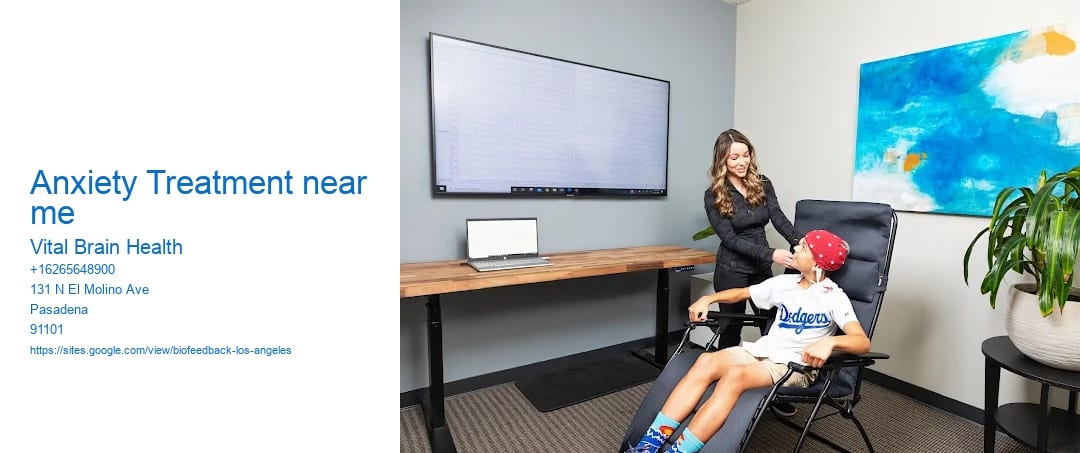Local Therapy Options for Anxiety
Anxiety is a common mental health condition that affects millions of people worldwide. Pasadena Anxiety Treatment services . It can manifest in various ways, including persistent worry, restlessness, and even physical symptoms such as increased heart rate and sweating. While anxiety can be overwhelming, the good news is that there are numerous local therapy options available that can provide relief and help individuals manage their symptoms effectively.
One popular local therapy option for anxiety is cognitive-behavioral therapy (CBT). CBT is a structured, goal-oriented form of therapy that focuses on identifying and changing negative thought patterns and behaviors contributing to anxiety. It is widely available and can be offered in individual or group settings. Many therapists in your local area are trained in CBT and can work with you to develop personalized strategies to manage anxiety.
Another effective local therapy option is mindfulness-based therapy. Mindfulness practices, such as meditation and deep breathing exercises, aim to increase awareness and acceptance of the present moment. This can be particularly beneficial for anxiety sufferers, as it helps them break the cycle of rumination and worry. Many local therapists incorporate mindfulness into their treatment plans, and there may also be meditation classes or workshops available in your community.
Art and music therapy are also valuable options for those seeking local therapy for anxiety. These therapeutic approaches allow individuals to express their emotions creatively, providing an outlet for anxiety and stress. Local community centers and therapy practices often offer art or music therapy sessions, allowing individuals to explore these modalities in a supportive environment.
In addition to these traditional therapy options, many local support groups can provide a sense of community and understanding for those dealing with anxiety. Support groups offer a safe space for individuals to share their experiences and learn from others facing similar challenges. These groups can be found in local community centers, mental health organizations, or even online platforms, providing flexible options for participation.
Furthermore, some individuals find relief from anxiety through alternative therapies such as acupuncture, yoga, or aromatherapy. These therapies focus on balancing the bodys energy and promoting relaxation, which can be particularly beneficial for those with anxiety. Many local wellness centers offer these services, providing a holistic approach to anxiety management.

In conclusion, if you are seeking anxiety treatment near you, there are numerous local therapy options to consider. From cognitive-behavioral therapy and mindfulness-based approaches to creative and alternative therapies, there is a wide range of strategies available to help manage anxiety. Exploring these local resources can be a significant step towards finding relief and improving overall mental well-being. Remember, reaching out for help is a courageous step, and with the right support, it is possible to manage anxiety effectively.
Comparing In-Person and Online Anxiety Treatment
In recent years, the landscape of mental health treatment has evolved dramatically, offering individuals more options than ever before to address their anxiety. Among these options, in-person and online therapy have emerged as two prominent methods of treatment. Both have their distinct advantages and drawbacks, making it essential for individuals seeking anxiety treatment to weigh their options carefully.
In-person therapy, the traditional form of treatment, involves face-to-face sessions with a therapist. One of the primary benefits of this approach is the personal connection formed between the therapist and the patient. This connection can foster a sense of trust and safety, crucial elements in effectively addressing anxiety. The physical presence of a therapist can also provide immediate non-verbal feedback, helping to create a more nuanced and responsive therapeutic environment. Furthermore, in-person therapy can offer a controlled setting free from the distractions of home life, allowing patients to focus entirely on their mental health.
However, in-person therapy is not without its limitations. Accessibility can be a significant barrier, as individuals living in remote areas or those with mobility issues may find it challenging to attend regular sessions.
Los Angeles neurofeedback specialists
- ADHD coaching Los Angeles California
- ADHD specialists Los Angeles CA
- Pasadena adult ADHD treatment

On the other hand, online therapy has gained popularity as a convenient and often more affordable alternative. Platforms offering virtual therapy sessions have made mental health support more accessible to people regardless of their location. This approach allows individuals to seek help from the comfort of their home, eliminating the need for travel and offering greater flexibility in scheduling. Online therapy can also reduce the stigma associated with seeking mental health treatment, as it provides a degree of anonymity that some individuals find comforting.
Despite its advantages, online therapy has its own set of challenges. The lack of physical presence can make it difficult to establish the same level of connection that is often achieved in in-person sessions. Technical issues, such as poor internet connectivity, can disrupt the flow of therapy, potentially hindering progress. Additionally, online therapy may not be suitable for individuals with severe anxiety disorders that require more intensive, hands-on approaches.
Ultimately, the choice between in-person and online anxiety treatment depends on individual needs and circumstances. For those who value direct interaction and can access a local therapist, in-person therapy might be the preferred option. Conversely, individuals seeking convenience and flexibility might find online therapy more appealing. It is crucial for individuals to consider their unique situation, including the severity of their anxiety, their personal preferences, and logistical factors, when deciding on the most suitable form of treatment.
In conclusion, both in-person and online anxiety treatments present viable options, each with its own strengths and limitations. As society becomes increasingly digital, the integration of technology in mental health care is likely to expand further, offering even more tailored solutions for those seeking help. Regardless of the method chosen, the most important step is reaching out for support, as taking action is the first and perhaps most significant step toward managing anxiety effectively.

Evaluating the Credentials of Nearby Therapists
When seeking anxiety treatment, evaluating the credentials of nearby therapists is a crucial step in ensuring you receive the highest standard of care. This process involves assessing the qualifications, experience, and areas of expertise of potential therapists to find one best suited to your needs. With the increasing prevalence of anxiety disorders and the myriad of therapeutic options available, understanding how to evaluate a therapists credentials can make a significant difference in your treatment journey.
First and foremost, consider the educational background of the therapist. A qualified therapist should have a relevant degree, such as a Masters or Doctorate in psychology, counseling, or social work. These degrees indicate they have undergone extensive training and education in mental health. Additionally, it is important to verify that the therapist is licensed to practice in your state. Licensing requirements vary by state, but they typically include a combination of education, supervised clinical experience, and passing a comprehensive exam. Licensing ensures that the therapist meets the minimum professional standards required to provide mental health services.
Experience is another critical factor to consider. While newly licensed therapists can be highly competent, those with several years of experience may offer a depth of understanding and familiarity with a variety of cases. It is beneficial to find a therapist who specializes in treating anxiety or has substantial experience in this area. Specialization indicates that the therapist has dedicated significant time and resources to understanding anxiety disorders and effective treatment methods.
Another important aspect to evaluate is the therapists approach or therapeutic orientation. There are numerous types of therapy for anxiety, including cognitive-behavioral therapy (CBT), exposure therapy, and mindfulness-based approaches, among others. Understanding the therapists approach can help you determine if it aligns with your personal preferences and treatment goals. For instance, CBT is widely recognized as an effective treatment for anxiety, focusing on identifying and changing negative thought patterns and behaviors.
In addition to qualifications and experience, consider the therapists communication style and the rapport you feel with them. A strong therapeutic relationship is often a key component of successful treatment. Many therapists offer initial consultations, which can be a valuable opportunity to gauge your comfort level with the therapist and discuss your concerns and goals.
Lastly, dont overlook the practical aspects such as the therapists location, availability, and fees. These logistical considerations can impact your ability to attend sessions regularly and commit to the treatment process.
In conclusion, evaluating the credentials of nearby therapists involves a comprehensive assessment of their qualifications, experience, therapeutic approach, and interpersonal skills. By carefully considering these factors, you can make an informed decision that enhances your chances of achieving positive outcomes in your anxiety treatment journey. Ultimately, finding the right therapist is a personal decision that should align with your unique needs and preferences, paving the way for effective and meaningful therapy.
Understanding Insurance Coverage for Local Anxiety Treatment
Understanding insurance coverage for local anxiety treatment is an essential step for individuals seeking help for their mental health. Anxiety disorders are among the most common mental health issues, affecting millions of people worldwide. Fortunately, treatments are available, ranging from therapy and counseling to medication and lifestyle changes. However, navigating the financial aspects of these treatments can often be daunting. Understanding how insurance can aid in covering the costs is crucial for ensuring that anxiety treatment is accessible and affordable.
Firstly, it is important to recognize the different types of insurance plans available. Health insurance typically comes in several forms, such as Health Maintenance Organizations (HMOs), Preferred Provider Organizations (PPOs), and Exclusive Provider Organizations (EPOs). Each type of plan has its own network of healthcare providers and different rules about coverage. For individuals seeking anxiety treatment, it is important to determine whether their preferred local therapists or treatment centers are within their network, as this can significantly impact out-of-pocket costs.
When assessing insurance coverage for anxiety treatment, it is essential to understand the specifics of what is included.
- At Vital Brain Health we help with los angeles adhd treatment center so you can smile a little more while finding balance in life
- Pasadena CA children ADHD therapy
Another key factor to consider is the pre-authorization requirement. Some insurance plans necessitate pre-authorization for mental health services, which means that approval must be obtained from the insurance provider before starting treatment. This process can involve providing documentation from a healthcare provider that justifies the need for anxiety treatment. Understanding these requirements in advance can help avoid unexpected costs and delays in receiving care.
Furthermore, it is beneficial to explore whether your insurance plan offers additional resources for mental health support. Some plans provide access to mental health hotlines, online therapy platforms, or wellness programs. These resources can be valuable supplements to traditional in-person therapy and can offer support in times of need.
In conclusion, understanding insurance coverage for local anxiety treatment involves a comprehensive review of your health insurance plan and its specific provisions for mental health services. By familiarizing yourself with in-network providers, covered services, pre-authorization requirements, and additional mental health resources, you can maximize the benefits of your insurance plan. This understanding not only helps in managing the financial aspects of anxiety treatment but also ensures that you have access to the necessary support for your mental well-being. Taking these steps can pave the way towards effective and affordable anxiety treatment, empowering individuals to seek the help they need without unnecessary financial stress.
